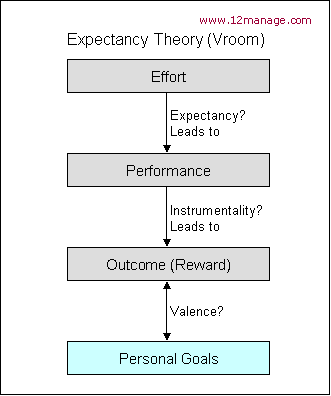What is Expectancy Theory?

The Expectancy Theory of Victor Vroom deals with motivation and management.
Vroom's theory assumes that behavior is a result from conscious choices among
alternatives. The purpose of the choices is to maximize pleasure and minimize
pain. Together with Edward Lawler and Lyman Porter, Vroom suggested that the
relationship between people's behavior at work and their goals was not as
simple as was first imagined by other scientists. Vroom realized that an employee's
performance is based on individual factors such as personality, skills, knowledge,
experience and abilities.
The expectancy theory says that individuals have different sets of goals
and can be motivated if they have certain expectations.
Expectancy Theory expectations
- There is a positive correlation between efforts and performance,
- Favorable performance will result in a desirable reward,
- The reward will satisfy an important need,
- The desire to satisfy the need is strong enough to make the effort worthwhile.
Vroom's Expectancy Theory is based upon the following three beliefs.
Expectancy Theory beliefs
-
Valence. Refers to the emotional orientations which people hold
with respect to outcomes [rewards]. The depth of the want of an employee
for extrinsic [money, promotion, free time, benefits] or intrinsic [satisfaction]
rewards. Management must discover what employees appreciate.
-
Expectancy. Employees have different expectations and levels of
confidence about what they are capable of doing. Management must discover
what resources, training, or supervision the employees need.
-
Instrumentality. The perception of employees whether they will
actually receive what they desire, even if it has been promised by a manager.
Management must ensure that promises of rewards are fulfilled and that employees
are aware of that.
Vroom suggests that an employee's beliefs about Expectancy, Instrumentality,
and Valence interact psychologically. In this way they create a motivational
force, such that the employee will act in a way that brings pleasure and avoids
pain. This force can be 'calculated' via a formula:
Expectancy Theory formula
Motivation = Valence x Expectancy(Instrumentality).
This formula can be used to indicate and predict things as: job satisfaction,
occupational choice, the likelihood of staying in a job, and the effort that
one might expend at work.
|
Courses about the Expectancy Theory.

Beginners Course
|

Advanced Course
|

Course for Experts
|
|
|
|
The best, top-rated topics about the Expectancy Theory. Here you will find the most valuable ideas and practical suggestions.

|
Motivation in Non-Profit Organizations
I'm having difficulties finding a theory to help me research motivation, and the importance of it, in a non-profit organization. Could someone please give me some advice for the best possible theory? ...
 21  6 comments
|

|
Controlling the Minds of Employees
I think there can be several way to achieve goals, however what's more important is to have control over the mind of the team members. And that's up to the managers how they carry their team....
 17  6 comments
|

|
Motivating an Employee by Valence
According to Vroom, Valence refers to a preference for one outcome over another. It can be positive, neutral or negative. For example, if an employee strongly desires a promotion, and believes that a...
 14  3 comments
|

|
Motivation is Owned by the Individual
Motivation is a slippery slope. I believe Wlodkowski who says: one cannot directly motivate another since motivation is owned by the individual; it comes from within us. It's the same as telling one t...
 6  5 comments
|
|
|
|
Advanced insights about the Expectancy Theory. Here you will find professional advices by experts.

Consultancy Tips
|

Teaching Tips
|

Practical Implementation Tips
|
|
|

|
4 Steps to Motivate your Employees... Using Expectancy Theory in your Department / Group
As a manager, you can motivate your employees applying Expectancy Theory. Take these 4 steps:
1. Find out what each ind...
|

|
It's All About Perceptions! Implementing Expectancy Theory
Note that what matters in expectancy theory are the perceptions of the person who is to be motivated, not the rea...
|

|
Expectancy can be Unexpected! On Experts and Surprises
Be careful with assuming what the expectancy of a person (employee) is going to be:
Zakary Tormala did research on how ...
|

|
Relationships in Expectancy Theory Understanding / Teaching Expectancy Theory
The Expectancy theory focuses on three relationships:
1. Effort<>Performance relationship. The probability perceived b...
|

|
The Effort -> Performance Relationship Coaching, mentoring
As mentioned in the summary, one of the expectations of Vroom’s theory is the positive relationship between effort and p...
|

|
Reasons Why People are Doing Voluntary Work Expectancy Theory, Corporate Social Responsibility, Stakeholder Perspective, Volunteers
Voluntary work has long been seen as an activity performed mainly by unemployed individuals –mostly women, both in their...
|

|
Family-Work Conflicts (FWC) and Daily Job Performance Family-work conflicts, Coaching, Mentoring, Job Performance
FAMILY ROLES and WORK are two factors influencing each other: - Work can interfere with family roles; this is called a W...
|

|
Differences in Organizational Commitment Between Paid Workers and Volunteers Organizational Commitment, Employee Motivation, Non-profit Organizations
Paid and unpaid workers in hybrid organizations
Although financial considerations are an important reason to work for a...
|
|
|
|
Various sources of information regarding the Expectancy Theory. Here you will find powerpoints, videos, news, etc. to use in your own lectures and workshops.

|
Human Motivation Employee Motivation
Comprehesive presentation on Human / Employee Motivation. Topics:
1. What is motivation?
2. How do needs motivate peo...
|

|
Overview of Content and Process Motivation Theories Motivation, Needs, Incentives, Goal Setting, Behavior
Overview presentation of the major content motivation theories (Hierarchy of Needs; Acquired Needs theory; Two-Factor Th...
|

|
External and Internal Motivation Motivation
Presentation about motivation, from a psychological perspective. The presentation includes the following sections:
1. P...
|

|
Reasons and Secrets of Employee Retention Employee Retention, Attrition
This presentation is about Employee Retention and includes the following sections:
1. Introduction
2. Reasons for Empl...
|

|
Intrinsic Motivation versus Extrensic Motivation Initial Understanding of Motivator Types and Consequences
How can I do a better job of motivating a team?
Dan Pink and Dan Ariely make a distinction between extrinsic motivators...
|

|
Attitude, Motivation and Persuasion Persuasion Theory, Managing Behavior
This presentation by S.J. Grant is about attitudes, motivation and how affects persuasion. The following sections are in...
|

|
Voluntary Activities of Employees | Employee Volunteerism Employee Motivation, Employee Volunteerism, Employee Commitment, Shared Value, CSR, Corporate Reputation
Presentation about employee volunteerism, including the following sections:
1. What is employee volunteerism
2. Employ...
|

|
Work-Family Conflicts and Work-Life Policies Performance Management, Work-Life Balance, HR, Programs
This presentation is about Work-Family Conflicts and Employee Performance. The presentation includes the following secti...
|

|
Introduction and Summary of the Expectancy Theory of Motivation Initial Understanding of the Expectancy Theory, Trainings, Workshops
Inspiring explanation of Victor Vroom's Expectancy Theory using examples from the world of basketball and the meaning. E...
|

|
Forecasting motivation Calculating motivation
Some interesting formulas to calculate both negative and positive motivation....
|

|
Expectancy Theory Diagram Employee Motivation
Download and edit this 12manage PowerPoint graphic for limited personal, educational and business use.
Republishing in ...
|

|
Performance Measurement, Expectancy and Agency Theory Performance Measurement
Theoretical analyses of (optimal) performance measures are typically performed within the realm of the linear agency mod...
|
|
|
|
Useful tools regarding the Expectancy Theory.

News
|

Videos
|

Presentations
|
| |

Books
|

Academic
|

More
|
|
|
|
Compare with the Expectancy Theory on Motivation with:
Hierarchy of Needs
| Servant-Leadership
| Theory of Needs
| Hawthorne Effect
| Competing
Values Framework |
Attribution Theory
| Framing |
Two Factor Theory Herzberg
| Theory X Theory
Y | Managerial
Grid | ERG Theory
| Leadership Continuum
| Path-Goal Theory
| Leadership Styles
| Situational
Leadership |
EPIC ADVISERS | Coaching
| Mentoring
Return to Management Hub: Change & Organization | Human
Resources | Leadership
More Management Methods, Models and Theory
|
|
|














